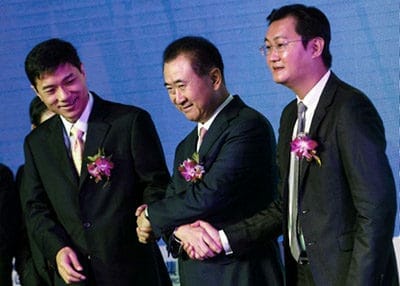
Tencent’s Pony Ma (right), Wanda’s Wang Jianlin (centre) and Baidu’s Robin Li (left) struggled to make ffan relevant
Dalian Wanda Group is still licking its wounds after Tencent and Baidu walked away from the trio’s $3 billion ffan.com ecommerce joint venture in August. However, the conglomerate controlled by China’s richest man may not be quite ready to fold on its gamble to grab a piece of China’s fast-growing online sector.
Wanda boss Wang Jianlin is going all in by spinning off the company’s ffan payment card, Internet financing business, credit-rating operations and other tech related holdings into a newly formed Internet division, Wanda announced in a press release. The newly incorporated Wanda Internet Technology Group is the latest move for the firm as it strives to transform from mall builder to global conglomerate. The assets had previously been housed under Wanda’s financial division.
The new Wanda arm will be led by former Wanda Financial Group President Qu Dejun, with former Google Greater China President John Liu working as Vice President and COO of the Internet technology group.
It appears Wanda is already looking at ways to revamp ffan under the new organizational structure. The e-commerce outfit led a $230 million round of funding in China-based smart parking mobile app operator ETCP. The self proclaimed smart parking app claims to span more than 5,000 parking garages in shopping malls, office buildings and residential sites in 10 Chinese cities.
Back to the Drawing Board for Tech Assets

Whale of a tale? ffan has invested into the ETCP parking app as Wanda hopes to revive the tech platform’s fortunes
In its original incarnation, the much-ballyhooed ffan was designed to make China’s richest man a little richer, but failed to gain traction in the highly competitive ecommerce arena. Designed as an online-to-offline (O2O) shopping platform, Wanda teamed with Tencent, maker of the WeChat app, and Baidu, China’s largest search provider, on the project.
The joint venture between the three heavyweights invested RMB 5 billion (then $814 million) on the web platform with dreams of creating a $3 billion ecommerce sensation. Shortly after that announcement, Wanda acquired a controlling stake in little known third-party payment provider 99bill for a reported RMB 2 billion (then $320 million).
Despite the investment, the platform never got off the ground. It took eight months for a website to be developed and the platform suffered from a lack of available merchandise and a disappointing mobile application.
Both Tencent and Baidu quietly washed their hands of the project this year, leaving Wang in charge of ffan along with 99bill and several other tech-related companies that have now been bundled into the Wanda Internet Technology Group.
Not as Easy as it Looks
Despite Wang’s lofty ambitions for Wanda, the ecommerce setback is the latest for a firm that hasn’t always found success beyond the real estate sector. In 2015 the mall tycoon said he wanted Wanda to transform into a $200 billion global conglomerate covering everything from finance, to ecommerce, to movies and theme parks.
While Wanda is now active in all these sectors, but results have been mixed. It continues to build theme parks recently announcing plans for a RMB 63 billion ($9.45 billion) tourism and sports complex in the industrial city of Jinan. However, its much-hyped Wuhan Wanda Movie Park closed in August for upgrades and renovations 19 months after opening with media reporting attendance numbers were waning.
Earlier this year, Wanda shelved plans to restructure its entertainment assets when it came to light that Legendary Entertainment, which it purchased for a reported $3.5 billion in January, had lost $500 million in 2015. The plans called for Legendary and Chinese production subsidiary Wanda Media to be merged with movie theatre chain, Wanda Cinema Line.
Leave a Reply